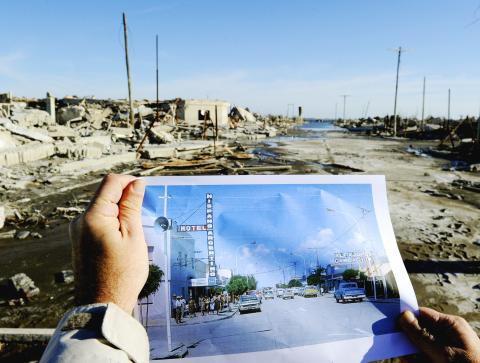In a town all but destroyed when its salt lake overflowed over three decades ago, the desolation is surreal: from silvery-white empty houses and hotels to trees, stark and dead; and one lonely man who calls this home.
Once a lake country spa town south of Buenos Aires, Epecuen is a lagoon with a salinity level only topped by the Dead Sea. For decades, tourists visited to take its waters believing they were good for one’s health.
Everything came crashing down in 1985 when a long period of heavy rains sent the lagoon bursting over its banks, and it swept over a busy small town.

Photo: AFP
“I had a bunch of cats and dogs, and they ran away a couple days before the flood and I never saw them again,” Norma Berg, 48, said, recalling her childhood spent here, until the flood.
“I think my pets could feel that the water was coming,” Berg said, as she glanced at the rubble of the childhood home she fled.
A town of about 40 square blocks, Epecuen was submerged beneath 10m of water.
Even when the waters eventually receded, the country town, 550km south of the capital, was never rebuilt. Its welcoming little hotels seem frozen in time, rot and rust, glistening with the salt in which they were steeped.
Berg recalls that fateful date — Nov. 10, 1985 — when the flood barely left her family and the town’s 1,500 other residents enough time to grab some belongings and run.
“A lot of the locals never, ever came back; other people just died of the shock and stress of losing everything,” Berg said sadly.
However, someone did come back. One man.
“Until about four or five years after the flood, when the waters were still high, nobody came around here at all,” said Pablo Novak, 81.
“I was totally alone. All day, every day,” said Novak, now the town’s only inhabitant.
Every day, he climbs on his bicycle and rides around surveying the eerie shells of 185 hotels, restaurants and other businesses that existed before 1985.
“I am OK here. I am just alone. I read the newspaper. And I always think of the town’s golden days,” of the 1960s and 1970s, Novak says.
Back then, as many as 20,000 people would visit every year to take the waters here.
Visitors pick up on Epecuen’s spooky vibe eying abandoned beds from a former old folks home, dozens of stranded, toppled night tables from local hotels, and upended materials visitors and businessmen tried to pry out of the rubble to reuse as construction materials.
The town’s surreal silvery cast has inspired filmmakers including Roland Joffe, who in 2009 filmed the Spanish civil war-drama There Be Dragons here; and Argentina’s Pino Solana, who filmed scenes of his El viaje (The Journey) locally.

A fire caused by a burst gas pipe yesterday spread to several homes and sent a fireball soaring into the sky outside Malaysia’s largest city, injuring more than 100 people. The towering inferno near a gas station in Putra Heights outside Kuala Lumpur was visible for kilometers and lasted for several hours. It happened during a public holiday as Muslims, who are the majority in Malaysia, celebrate the second day of Eid al-Fitr. National oil company Petronas said the fire started at one of its gas pipelines at 8:10am and the affected pipeline was later isolated. Disaster management officials said shutting the

US Vice President J.D. Vance on Friday accused Denmark of not having done enough to protect Greenland, when he visited the strategically placed and resource-rich Danish territory coveted by US President Donald Trump. Vance made his comment during a trip to the Pituffik Space Base in northwestern Greenland, a visit viewed by Copenhagen and Nuuk as a provocation. “Our message to Denmark is very simple: You have not done a good job by the people of Greenland,” Vance told a news conference. “You have under-invested in the people of Greenland, and you have under-invested in the security architecture of this

Japan unveiled a plan on Thursday to evacuate around 120,000 residents and tourists from its southern islets near Taiwan within six days in the event of an “emergency”. The plan was put together as “the security situation surrounding our nation grows severe” and with an “emergency” in mind, the government’s crisis management office said. Exactly what that emergency might be was left unspecified in the plan but it envisages the evacuation of around 120,000 people in five Japanese islets close to Taiwan. China claims Taiwan as part of its territory and has stepped up military pressure in recent years, including

UNREST: The authorities in Turkey arrested 13 Turkish journalists in five days, deported a BBC correspondent and on Thursday arrested a reporter from Sweden Waving flags and chanting slogans, many hundreds of thousands of anti-government demonstrators on Saturday rallied in Istanbul, Turkey, in defence of democracy after the arrest of Istanbul Mayor Ekrem Imamoglu which sparked Turkey’s worst street unrest in more than a decade. Under a cloudless blue sky, vast crowds gathered in Maltepe on the Asian side of Turkey’s biggest city on the eve of the Eid al-Fitr celebration which started yesterday, marking the end of Ramadan. Ozgur Ozel, chairman of the main opposition Republican People’s Party (CHP), which organized the rally, said there were 2.2 million people in the crowd, but